
Tishman Center for Social Justice and the Environment
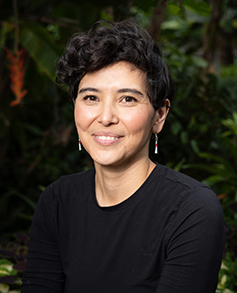 | Michelle Martinez, Inaugural Director of the Tishman CenterMichelle Martinez (MS ’08), a SEAS graduate, was appointed in July 2022 as the inaugural director of the Tishman Center. Martinez studied under Professor Emeritus Bunyan Bryant, and will continue to build on Bryant’s legacy of activism and involvement in grassroots movements. In her new role as inaugural director, she has developed courses on power building, community organizing and critical environmental justice, as well as anchoring powerful initiatives that support students who are pursuing lifelong careers in environmental and climate justice. In her first two years, she has supported research projects such as Dallas Black Clergy, expanding environmental justice programming within Faith in Texas; growing the Green New Deal Network’s Cities Program; spurring environmental justice within the Mata Tripta Gurudwara of SE Michigan; and fighting toxic pollution from fossil transit on the Great Lakes with Freshwater Futures, among others. Martinez has 18 years of experience practicing environmental justice in her hometown of Detroit. Most recently, she served as executive director of the Michigan Environmental Justice Coalition; she is a founding member of the Coalition. Martinez also serves on the board of directors of We the People Michigan and is a contributing columnist to Planet Detroit, an online publication serving Detroit audiences with climate and environmental news. |
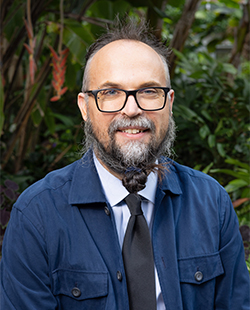 | Dr. Kyle Whyte, Faculty DirectorKyle Whyte, the George Willis Pack Professor at SEAS, is the founding faculty director of the Tishman Center. In this role he will provide overall leadership. He is the principal investigator of the Energy Equity Project, and affiliate professor of Native American Studies and Philosophy. His research addresses environmental justice, focusing on moral and political issues concerning climate policy and Indigenous peoples, the ethics of cooperative relationships between Indigenous peoples and science organizations, and problems of Indigenous justice in public and academic discussions of food sovereignty, environmental justice, and the anthropocene. He is an enrolled member of the Citizen Potawatomi Nation. Whyte is also serving as a member of the White House Environmental Justice Advisory Council. |
Mary Beth Jäger, Research CoordinatorMary Beth Jäger feels excited and privileged to be working with fellow Citizen Potawatomi member Dr. Whyte, Tishman Director Martinez and fellow staff and students of the Tishman Center. Jäger serves as a research coordinator and telecommutes from the Seattle area.
Outside of work Jäger is a tamale enthusiast, food on the water admirer, sweet on pan dulce, fangirl of the Three Sisters and the list goes on. Besides being a big fan of food, Jäger believes food is medicine and central to culture. | |
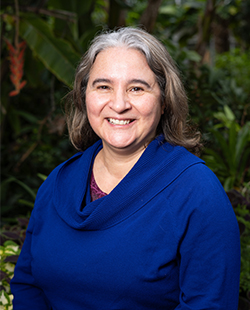 | Paula Astudillo, Project CoordinatorPaula Astudillo (Master in Education – U of M 2011) brings her passion for education justice and collective people empowerment, which was lastly sharpened while working in the research and evaluation office of Detroit Public School Community District and mentoring women and LGBTQ+ of color in STEMM and open science projects with diverse communities in the US. At the Tishman Center, Paula is the Project Coordinator, dedicated to fostering an empowering workplace climate, especially for our environmental justice students. Paula’s primary focus is cultivating an organizational culture centered on care, collegiality, and mutual support. |
Current Student Researchers
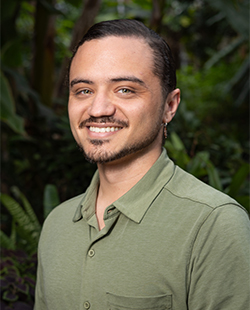 | Malu Castro, Community Research Coordinator, PhD CandidateK. Malulani Castro (European settler/kānaka ʻōiwi/Puerto Rican/diaspora) is a doctoral candidate in the Resource Policy and Behavior program at the University of Michigan's School for Environment and Sustainability where he works with Dr. Kyle Powys Whyte (Citizen Potowatomi) on issues of Indigenous ecological philosophies and Indigenous political economic organizing. In that capacity, Malu teaches courses on Indigenous sustainability and Indigenous rights while also providing technical support to land defense and land back initiatives. Malu's scholarly interests lie at the messy intersection of philosophy, ethics, history, economics, spirituality and action, particularly around the contemporary land back movement. Malu's dissertation is rooted in an ʻāina(land)back initiative on the island of Moloka'i where he is hoping to develop a deeper understanding of the real transformational capacity of land back at-large. |
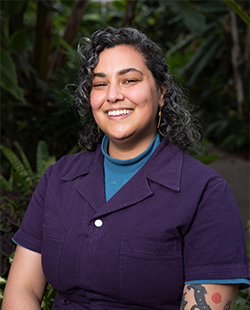 | Lizz Malloy, Indigenous Research Fellow |
 | Lyric Patterson, Detroit Just Transition 2024 Summer FellowGrad: 2025Lyric Patterson is Master’s student at SEAS studying environmental justice and environmental policy (Grad: Spring 2025). A first-generation college graduate from Oakland, CA, she is passionate about creating an equitable and sustainable society. Lyric’s interests range from equitable access to clean air, clean water, and quality green spaces to Indigenous rights, land back, climate adaptation and much more. Lyric is the student leader of Uproot: transcending and radicalizing environmental education, and an elected 2024-2025 EJ Track Leader! Currently Lyric is researching the impacts of green gentrification, including solar and energy efficiency initiatives, on long-term land tenure (housing values and taxation) in Detroit’s historically Black neighborhoods with the Tishman Center. |
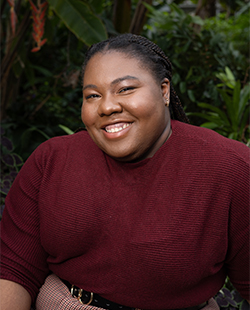 | Amina Dunn, W24-Fall 2024 Interdisciplinary OrganizerAmina Dunn is a master’s student from Washington D.C. specializing in environmental justice. Her interests primarily lie in the intersections between culture, community building, and urban development. Before attending the University of Michigan, Amina worked as a survey researcher at Pew Research Center focusing on U.S. Politics. She currently serves the elected track leader for the environmental justice track. In her capacity at the Tishman Center brings student researchers of different disciplines for dialogue, activities, and political action. She was awarded the Rackham DEI position in Winter 2024, and remains on the Tishman Team in Fall 2024. Her Master’s Project studies the impact of Federal funding on solar initiatives in Detroit Michigan. Amina holds a bachelor’s degree in sociology and theater studies from Emory University. |
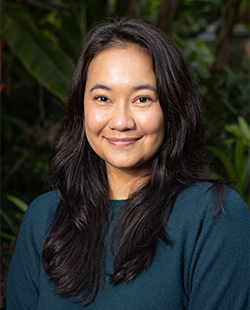 | Tara Apo-Priest, Tishman 2024-2025 Catalyst Fellow for Indigenous RightsGrad: Spring 2025Tara Apo who was recruited and selected as the 2024-2025 inaugural Tishman Center Catalyst Fellow for Indigenous Rights. Tara is a current 1st year student and Kanaka Maoli, Native Hawaiian, from the island of Maui, where she has deep roots in community organizing and advocating for water justice and Native Hawaiian rights. She’ll be working with the County of Maui to develop a framework for community land tenure and the prevention of ancestral land loss in Maui County, which has recently been devastated by the impacts of climate change and colonialism in Lāhainā. |
2025–2026 Catalysts Fellows
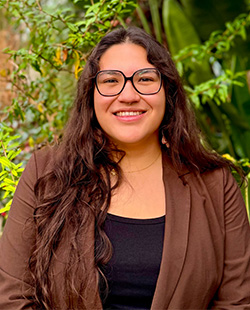 | Sarah AllenGrad: Spring 2026Sarah is a first year Master’s student in the Environmental Justice track at SEAS. She is an enrolled member of the Sault Ste. Marie Tribe of Chippewa Indians in the Upper Peninsula of Michigan. Prior to coming to SEAS, she worked at the Research for Indigenous Social Action and Equity Center at Northwestern University and focused on psychological research for Missing Murdered Indigenous Relatives, Violence Against Native Women, Indigenous Women in Leadership, and Indigenous Climate Justice. Her current project at SEAS involves collaborating with her tribe’s natural resource and cultural department to intertwine Ojibwe traditional ecological knowledge with western science. Sarah’s passion for social and environmental justice is rooted in Indigenous feminism, traditional ecological knowledge, culture and tradition, Landback and Waterback initiatives, and the rematriation of ancestral homelands. |
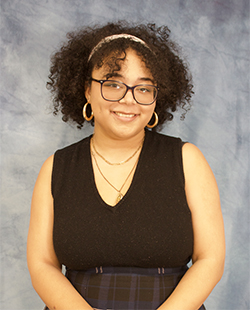 | Eleanor AroGrad: Spring 2026Eleanor is a first year master's student here at SEAS, with a focus on Environmental Justice. She grew up in Detroit, MI, and attended UM for my undergraduate degree where she triple majored in Earth & Environmental Sciences, Program in the Environment, and Spanish. In the future, Eleanor hopes to work with communities to adapt to the changes that climate change will cause, and to continue advocating for a socially and environmentally just world. |
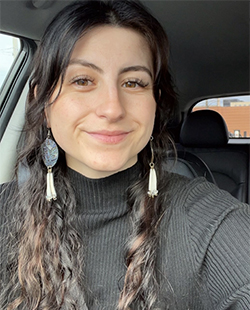 | Coral AveryGrad: Spring 2026Coral is a first generation college student in their first year of the Environmental Justice Masters program at SEAS. They are a citizen of the Shawnee Tribe and grew up on the west coast where they studied Human Dimensions of Natural Resources, Sustainability, and German at Oregon State University. Over the years, their work has centered on environmental education, multimedia art and communications, climate adaptation, environmental justice, traditional ecological knowledge, and sustainable community development. Coral is passionate about supporting Tribes and Indigenous communities as they build resilience to climate change in ways that center cultural preservation and revitalization. |
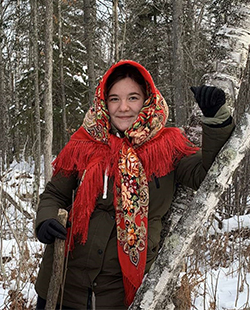 | Sofia LedenevaGrad: Spring 2026Sofia is a daughter of immigrant farmers who have taught her that love is shown through action. She has worked on a variety of projects with Tribal partners that have focused on culturally important species like Manoomin, tribal sovereignty, and co-stewardship initiatives. She has had the privilege to be mentored by people that care deeply about their work. She hopes to follow in their footsteps by continuing to do work that focuses on decolonial thought, community power-building, and is rooted in love, mutual care, and respect. |
 | Tamanna SenguptaGrad: Spring 2026Tamanna is a climate justice advocate and researcher committed to bridging the gap between technical solutions and grassroots empowerment. With experience supporting grassroots communities in India and a background in programming, Tamanna leverages her interdisciplinary expertise to drive equitable energy solutions. She is passionate about ensuring clean energy access for those most impacted by environmental challenges. |
2024 Student Researchers
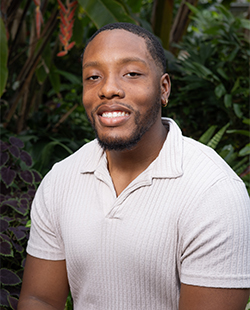 | Tre'Nard Morgan, Winter 2024 Alumni Network OrganizerGrad: Spring 2025Tre’Nard Morgan is a dual Master’s student studying Environmental Justice and Urban Planning at the University of Michigan (Grad: 2025). He’s from a small agrarian based town in South Florida known as Belle Glade affectionately nicknamed the “Muck”. Morgan received his bachelors from the University of Florida in Natural Resource Conservation before taking a learning year. As the Alumni Network Organizer he build channels of networks for current students and alumni by hosting webinars on leadership, mentorship and professional development. With the help of the Tishman Center team, EJ students will have more abundant resources within their time at SEAS and post-grad endeavors. |
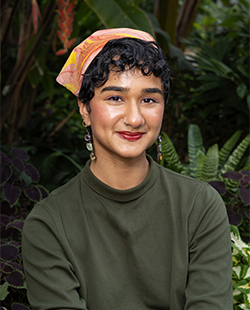 | Gayatri Nayaranan, Winter 2024, Community Wellness CoordinatorGrad: Spring 2025Gaya is a dancer, community healer, and facilitator in their first year of the Environmental Justice Master's program at SEAS. Their works braids dance, gender studies, and political ecology with the goal of making visible the gendered technologies of caste oppression in India and the diaspora. As a healer and facilitator, they are deeply interested in building knowledge on culturally relevant practices of transformative justice, with a focus on somatic healing and generative conflict. |
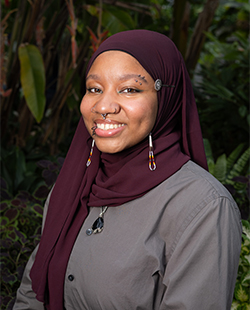 | Naajia Shakir, 2023-2024 Catalyst FellowGrad: Spring 2025Naajia Shakir is a dual graduate student at SEAS specializing in environmental justice and urban planning. She is focused on working within Black, Brown, and Indigenous communities disproportionately affected by multiple issues including food insecurity, gentrification, and severe environmental pollution and contamination. She believes that by building community and the cultivation of food and land, one not only has autonomy over the food they eat but can also grow connections to the land, practicing methods that their ancestors once did to sustain themselves and coexist with the environment. This is one of many conscious acts of resistance to reclaim our narrative and fight for justice. As a Catalyst Fellow, she worked to design a Strategic Plan outreach process for Toxic Taters. |
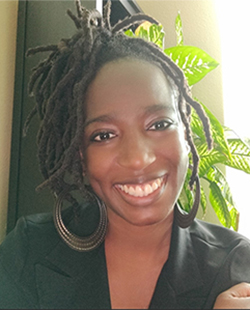 | Monique Rollins, 2023-24 Community Research OrganizerMonique Rollins is a graduate student at SEAS specializing in environmental justice (Grad: Spring 2025). She carries over a decade of professional experiences as a general and special educator in K-12 public education. During her time as a teacher, she was devoted to working in Title I schools that served high percentages of children from low-income families. Monique believes in the strength of community, the grace of paying goodness forward, and the responsibility of fostering the next generation. She aspires to confront environmental and social injustices through the transformative power of education and the solidarity found in knowledge-sharing. As the Community Research Organizer conducted literature reviews on mentorship, and helped convene programming for the Tishman Center fellows. |

